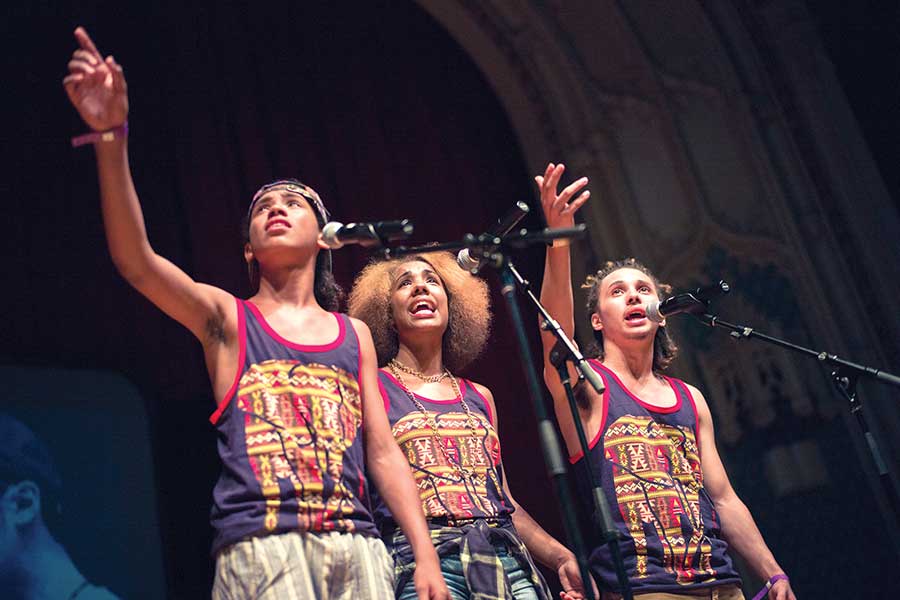At almost any sort of high-school sporting event, you can expect to hear the national anthem played. Whether it’s performed by the school’s marching band, sung by a nervous musical-theater student or blasted through worn-out speakers playing a 1970s orchestral version on cassette, I never got too excited about the routine. It was just always something I had to do.
So when the two emcees of the Brave New Voices poetry-slam competition asked us to stand for the national anthem, I wasn’t really expecting much. I stood up from my seat in the Zellerbach Theatre on the University of Pennsylvania’s campus thinking I would hear “The Star-Spangled Banner” begin to play. I quickly realized, when I heard the opening sequence of piano notes, that this wasn’t the national anthem — this was our national anthem.
“First I was afraid — I was petrified! Kept thinkin’ I could never live without you by my side … But then I spent so many nights thinkin’ how you did me wrong … And I grew strong … And I learned how to get along, and so you’re back! From outer space!”
The entire auditorium erupted in excitement. Kids fled their rows and flooded into the aisles dancing with one another, singing every lyric to Gloria Gaynor’s popular disco anthem “I Will Survive” as loudly as they could, and a few even did some mild twerking near the stage. It was by far my most memorable national-anthem experience to date.
This particular event at Brave New Voices was called Queeriosity, an open-mic night for queer and questioning youth poets to perform their slam poetry. So many kids wanted to participate that not every youth poet was able to perform. Names were drawn from a hat to see who would get to take the stage. There were a few groups, but mostly poets went on stage as solo acts — just them and a mic, standing in front of a packed auditorium of new friends and supporters.
The 17th-annual BNV poetry slam, a four-day festival held last month for the first time in Philadelphia, included 50 slam teams from across the country. The youth poets competed in four rounds of slam, in which local writers, performers, musicians, activists and educators judged the performances. Queeriosity was not a part of the actual competition, but it highlighted the overall goals of the event, according to BNV director Danez Smith.
“We strive to create a space where youth can come to share, grow and commune, but ultimately our goal is to give them the spirit and the tools to go back into their home communities to build and write and transform the spaces around them,” he said.
Smith, who has been attending since 2005, discussed the beginnings of the BNV poetry-slam competition and how it has evolved over time.
“Brave New Voices started 17 years ago as a small gathering of a few youth organizations from across the country,” he said. “It has grown into the largest international youth poetry slam in the world. Over the years, BNV has brought together young minds from all over the world for a week of celebration, collaboration and growth. We have been featured on HBO, and we have toured the country spreading the movement to all areas of the world.”
Smith, like many of the volunteers, coaches and mentors at BNV, and first got involved as a youth poet.
He said the energy and atmosphere stuck with him, and he eventually went on to help with the competition in other ways.
“I first attended BNV in 2005 when I was 15. I came with a local youth organization from the Twin Cities in Minnesota,” he said. “I was energized and mesmerized by everything I took in that year. I was empowered by the space and indebted to it for showing me the sheer power of young people actualizing the power of their voices. Since then, I’ve returned to the festival as a mentor, a coach, a volunteer facilitator, and now as the conference director.”
A youth poet who competed in the slam, Sabrina Slipchenko from Northeast High School in Philadelphia, described feeling as Smith did, which is why she wanted to compete at BNV.
“The slam-poetry scene got involved with me,” Slipchenko said. “The mixture of brutal honesty and intense energy has a way of drawing you in and keeping you there.”
Topics the youth poets spoke about ranged from feeling invisible, to the vast difficulties of being a queer adolescent at school, to the overwhelming oppression of religion and more.
“I write about things that make me angry,” Slipchenko said. “Wars, hunger, my dissatisfaction with the cis-male patriarchy, etc. I wish I could be a happy poet. I think the problem with that is happy feels the same for everyone — but there’s 1,000 degrees of upset to attempt to articulate.”
No matter what the topic, the most incredible part of Queeriosity was watching each youth poet share intimate feelings and details about themselves. The honesty and authenticity bared on stage was inspiring.
It takes a huge amount of guts to get on stage and speak your truth. After every performance, I clapped and stomped and snapped in awe of the incredible power of our voices.
“BNV is a space for young people to have the complete freedom to be themselves,” Smith said. “BNV is one of the first spaces that I felt comfortable enough to be queer out loud. For LGBTQ youth and any youth, this space is a sanctuary for identities often shamed or glossed over. It’s a great place to come and bask in the joy of expressing yourself in some radical, beautiful, definitely queer ways.”
For more information about Brave New Voices, visit http://youthspeaks.org/bravenewvoices/.
Matty Bennett, 23, is pursuing a master’s of fine arts in creative writing from Virginia Tech.
